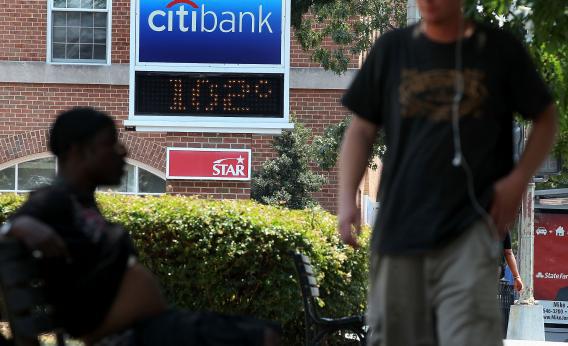Before the financial crisis hit, Americans were pretty sure that the globe was warming, and that humans were causing it, and that it was kind of a big deal. As the economy slumped, Americans decided that climate change wasn’t actually happening—and even if it was, it wasn’t our fault. And now, after a flurry of wild weather—deadly tornados, floods, droughts, an uncommonly mild winter, and recent heat waves—U.S. residents are back to believing that global warming is real. But we’re still hesitant to take the blame.
These generalizations are based on a series of Yale University studies over the last few years. According to Yale, Americans’ belief in global warming fell from 71 percent in November 2008 to just 57 percent in January 2010 but rebounded to 66 percent by this spring. The findings mirrored those of the National Survey of American Public Opinion on Climate Change, which showed belief in global warming bouncing from 65 percent in 2009 to 52 percent in 2010 and back up to 62 percent this year.
What accounts for the rebound? It isn’t the economy, which has thawed only a little. And it doesn’t seem to be science: The percentage of respondents to the Yale survey who believe “most scientists think global warming is happening” is stuck at 35 percent, still way down from 48 percent four years ago. (The statement remains just as true now as it was then—it’s the public, not the scientists, that keeps changing its mind.)
No, our resurgent belief in global warming seems to be a function of the weather. A separate Yale survey this spring found that 82 percent of Americans had personally experienced extreme weather or natural disasters in the past year. And 52 percent said they believed the weather had been getting worse overall in recent years, compared to just 22 percent who thought it had gotten better.
Maybe it was all that priming, but 69 percent of respondents in that March poll went on to say that they believed global warming was affecting the weather in the United States. And that, of course, was before the Colorado wildfires, and before the most recent wave of storms and heat in the Midwest and Northeast, which have brought renewed media attention to climate change. If you polled the country today, the number might well top 70 percent.
To the science-minded, it might be disconcerting that the weather drives Americans’ beliefs about climate change. After all, scientists’ models have been showing and predicting climate change for decades. And global warming’s relationship to any given weather trend is probabilistic, not causal, as David Roberts explained in a thoughtful Grist post recently.
On top of that, those who base their climate judgments on the weather rather than on science are missing out on all the data that link global warming to greenhouse gas emissions. That helps explain why, even as more people acknowledge global warming, fewer believe that humans are causing it. As Brian Merchant wrote in Slate a year ago, to turn climate skeptics into believers would probably require dismantling the denial industry and exposing more people to the actual evidence.
Still, it’s at least good to know that most Americans are aware enough of what global warming is supposed to entail—i.e., not just warmer temperatures but bizarre weather patterns—to know it when they (probably) see it.
